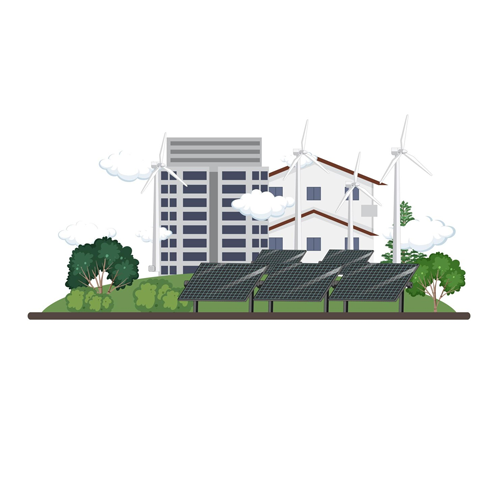Solar energy harnesses the sun’s power through photovoltaic cells, converting sunlight into electricity. It’s a renewable, sustainable resource, reducing dependence on fossil fuels and lowering greenhouse gas emissions. Solar panels, installed on rooftops or in solar farms, provide clean energy for homes, businesses, and grids. Advances in technology and decreasing costs make solar energy increasingly accessible and efficient. It plays a crucial role in combating climate change and promoting environmental sustainability.
1. Overview of Solar Energy
- Definition and Importance of Solar Energy
- History and Evolution of Solar Technologies
- Current Trends and Future Prospects
2. Solar Radiation and Solar Resource Assessment
- Basics of Solar Radiation
- Solar Resource Measurement and Estimation
- Tools and Techniques for Solar Resource Assessment
3. Introduction to Photovoltaic Technology
- Principles of Photovoltaic Conversion
- Types of Solar Cells (Monocrystalline, Polycrystalline, Thin-Film)
- PV Module and Array Configuration
4. Design and Installation of PV Systems
- Site Assessment and System Sizing
- Electrical Design and Configuration
- Mechanical Design and Mounting Structures
5. PV System Components
- Inverters, Batteries, and Charge Controllers
- Balance of System (BOS) Components
- Monitoring and Control Systems
6. Introduction to Solar Thermal Energy
- Principles of Solar Thermal Conversion
- Types of Solar Thermal Collectors (Flat-Plate, Evacuated Tube, Concentrated)
- Applications of Solar Thermal Energy (Water Heating, Space Heating, Industrial Processes)
7. Design and Installation of Solar Thermal Systems
- System Sizing and Configuration
- Heat Transfer Fluids and Storage Systems
- Integration with Existing Heating Systems
8. Introduction to Smart Energy Systems
- Definition and Importance of Smart Energy
- Key Components and Technologies
- Benefits and Challenges of Smart Energy Systems
9. Smart Grid Technology
- Basics of Smart Grid
- Advanced Metering Infrastructure (AMI)
- Demand Response and Load Management
10. Energy Storage Systems
- Types of Energy Storage Technologies (Batteries, Supercapacitors, Thermal Storage)
- Design and Integration of Energy Storage Systems
- Applications and Case Studies
11. Energy Management Systems (EMS)
- Components and Architecture of EMS
- Energy Monitoring and Data Analytics
- Optimization Techniques for Energy Efficiency
12. Building Energy Management
- Energy Efficiency in Buildings
- Smart HVAC and Lighting Systems
- Building Automation and Control
13. Renewable Energy Integration
- Integration of Solar and Other Renewables into the Grid
- Hybrid Renewable Energy Systems
- Challenges and Solutions for Grid Stability
14. Solar Power Plants
- Design and Operation of Large-Scale Solar Power Plants
- Grid Connection and Power Quality Issues
- Case Studies of Solar Power Plants
15. Smart Cities and Renewable Energy
- Concept of Smart Cities
- Role of Renewable Energy in Smart Cities
- Case Studies of Smart Cities Implementations
16. Emerging Technologies in Solar and Smart Energy
- Advances in Solar Cell Technology (Perovskite, Organic, Tandem Cells)
- Internet of Things (IoT) in Energy Systems
- Artificial Intelligence and Machine Learning Applications
17. Hands-on Projects in Solar Energy
- Designing a Residential PV System
- Developing a Solar Thermal Application
- Implementing a Solar-Powered IoT Device
18. Hands-on Projects in Smart Energy
- Setting up a Smart Home Energy Management System
- Developing a Smart Grid Simulation
- Implementing an Energy Storage Solution
19. Renewable Energy Policies and Regulations
- Overview of Global and Regional Policies
- Incentives and Subsidies for Solar and Smart Energy
- Compliance and Certification Standards
20. Economics of Solar and Smart Energy Systems
- Cost Analysis and Financial Modeling
- Economic Benefits and ROI
- Financing and Investment Options
21. Environmental Impact and Sustainability
- Environmental Benefits of Solar and Smart Energy
- Life Cycle Assessment and Carbon Footprint
- Strategies for Sustainable Development
22. Best Practices in Solar Energy Implementation
- Lessons Learned from Successful Projects
- Common Challenges and Solutions
- Future Directions and Innovations
23. Case Studies in Smart Energy Systems
- Real-World Applications and Success Stories
- Analysis of Innovative Projects
- Industry Trends and Future Prospects
24. Future Trends and Innovations
- Emerging Technologies and Market Trends
- Role of AI and Big Data in Energy Systems
- Future Directions for Solar and Smart Energy


